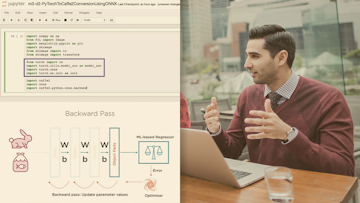
Caffe2 is an open-source deep learning framework and competitor to frameworks such as TensorFlow, Apache MXNet and PyTorch. It's focus is on efficiency and works well with constrained environments such as on mobile devices. In this course, Caffe2: Getting Started, you'll learn the fundamentals of building neural nets and working with Caffe2, get introduced to the Caffe2 Model Zoo and see how you can import models from PyTorch to Caffe2 using ONNX. First, you'll discover the basic building blocks of Caffe2, blobs and workspaces, nets and operators, and put those together to build neural networks to perform tasks such as regression...
Read more
Good to know
Save this course
Activities
Career center
Artificial Intelligence Engineer
Deep Learning Specialist
Machine Learning Engineer
Data Scientist
Robotics Engineer
Data Analyst
Research Scientist
Computer Vision Engineer
Operations Research Analyst
Risk Analyst
Financial Analyst
Business Analyst
Statistician
Software Engineer
Computational Scientist
Featured in The Course Notes
Reading list
Share
Similar courses
OpenCourser helps millions of learners each year. People visit us to learn workspace skills, ace their exams, and nurture their curiosity.
Our extensive catalog contains over 50,000 courses and twice as many books. Browse by search, by topic, or even by career interests. We'll match you to the right resources quickly.
Find this site helpful? Tell a friend about us.
We're supported by our community of learners. When you purchase or subscribe to courses and programs or purchase books, we may earn a commission from our partners.
Your purchases help us maintain our catalog and keep our servers humming without ads.
Thank you for supporting OpenCourser.



